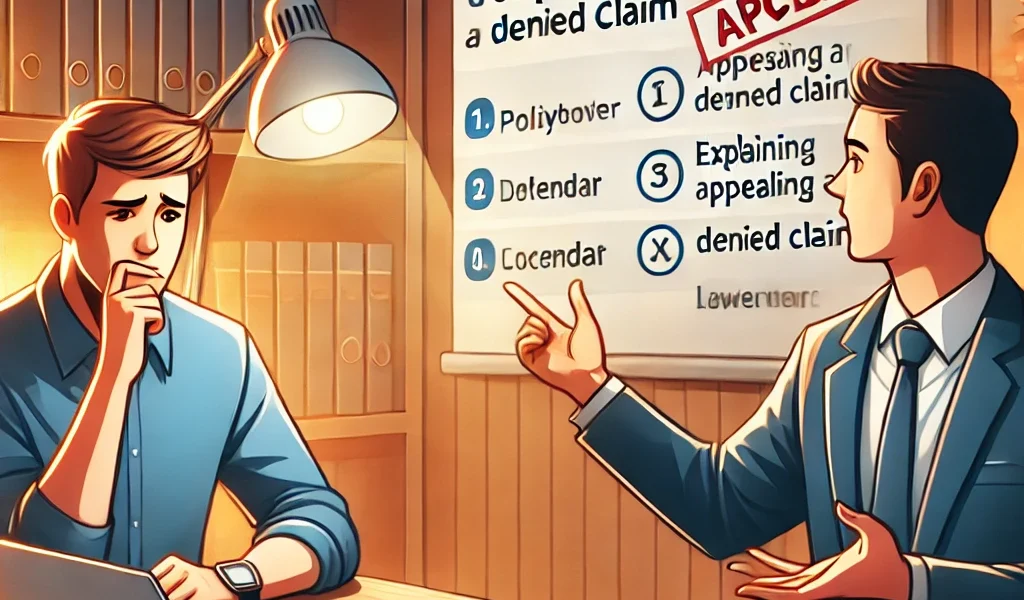Introduction
Filing an insurance claim can be a complex process, and facing a claim denial can be frustrating and overwhelming. However, a denied claim does not necessarily mean the end of the road. Many policyholders successfully appeal claim denials and secure the compensation they deserve.
This step-by-step guide will help you understand why insurance claims get denied and how you can effectively appeal the decision to maximize your chances of approval.
Common Reasons for Insurance Claim Denials
Understanding why your claim was denied is the first step in formulating a strong appeal. Here are some common reasons:
- Incomplete or Incorrect Information: Missing documents, incorrect details, or incomplete forms can lead to claim rejection.
- Lapsed Policy: If your policy has expired or premiums are overdue, your claim may not be processed.
- Policy Exclusions: Certain damages or losses may not be covered under your policy.
- Lack of Proper Documentation: Insufficient proof of loss, ownership, or medical necessity can result in denial.
- Failure to Notify Insurer on Time: Many policies require claims to be filed within a specific timeframe.
- Disputed Liability: In cases like car accidents, the insurer may deny a claim if fault is disputed.
- Pre-Existing Conditions: Health or life insurance claims may be rejected due to undisclosed pre-existing conditions.
Step-by-Step Guide to Appeal a Denied Insurance Claim
Step 1: Review the Denial Letter Carefully
- The insurance company will provide a denial letter stating the reason for rejection.
- Read the letter thoroughly to understand the exact reason for the denial.
- Check for any errors in their assessment.
Step 2: Gather Supporting Documents
- Collect all necessary documents, including claim forms, receipts, invoices, medical reports, and photographic evidence.
- If your claim was denied due to missing documents, gather and submit them promptly.
- Obtain a second opinion if required (for medical or auto claims).
Step 3: Contact Your Insurance Provider
- Reach out to the claims department for clarification on the denial.
- Request a detailed explanation and inquire about possible resolutions.
- Take notes during the conversation, including the representative’s name and date of the call.
Step 4: File a Formal Appeal
- Draft a clear and concise appeal letter outlining:
- Your policy details (policy number, coverage details).
- The reason for denial as stated by the insurer.
- Supporting documents that counter their denial reason.
- A request for reconsideration with a strong argument.
- Submit your appeal letter along with the necessary documents to the claims department.
Step 5: Follow Up Regularly
- Insurance companies can take time to process appeals, so follow up via email or phone regularly.
- Keep records of all communications, including responses from the insurer.
Step 6: Consider Mediation or Third-Party Review
- If the appeal does not yield favorable results, check if the insurer offers mediation services.
- A third-party mediator can help resolve disputes without legal action.
- Some states have insurance ombudsman programs to help consumers with claim disputes.
Step 7: File a Complaint with the Insurance Regulatory Body
- If the insurance company is uncooperative, you can escalate the issue to your country’s insurance regulatory authority.
- In the U.S., you can contact your state insurance department.
- In India, you can approach the Insurance Ombudsman.
Step 8: Seek Legal Help If Necessary
- If all else fails, consult an attorney specializing in insurance claims.
- A lawyer can assess whether legal action against the insurance provider is necessary.
Tips to Strengthen Your Appeal
- Be Prompt: File your appeal as soon as possible to avoid deadlines.
- Maintain a Paper Trail: Keep copies of all communications, documents, and evidence.
- Remain Professional and Persistent: Communicate calmly and professionally with insurance representatives.
- Get Expert Opinions: Consult independent assessors or specialists if necessary.
- Understand Your Rights: Read your policy thoroughly and know what you are entitled to claim.
Conclusion
Having an insurance claim denied can be frustrating, but it’s not the final decision. By understanding the reasons behind the denial and following the proper appeal process, you can improve your chances of getting the claim approved. Always review your policy details, gather strong supporting evidence, and be persistent in your follow-ups. If necessary, seek mediation or legal support to ensure a fair settlement.
Have you ever faced a denied insurance claim? Share your experience in the comments!



